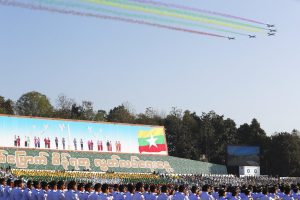The head of Myanmar’s military administration has detailed plans for the administration’s planned election – perhaps more accurately referred to as an “electorally-flavored political exercise” – later this year.
Speaking during a ceremony in Naypyidaw yesterday marking the 75th anniversary of Myanmar’s independence from Great Britain, Senior Gen. Min Aung Hlaing urged the Myanmar people and the wider world to support the election. He described it as an important step toward what the military establishment refers to as “the genuine, discipline-flourishing multiparty democratic system.”
Min Aung Hlaing then presided over a large-scale parade in which “military units and civil servants marched in formation close to the grandiose parliament complex while fighter jets, bombers, and helicopters flew overhead,” The Associated Press reported.
The junta’s election, planned for August, is set to take a step forward next month, when the state of emergency imposed after the February 2021 coup d’etat (and renewed twice since) expires. This will also usher in a likely name change for the military administration, which is now formally known as the State Administration Council (SAC).
“Upon accomplishing the provisions of the state of emergency, free and fair elections will be held in line with the 2008 constitution, and further work will be undertaken to hand over state duties to the winning party in accordance with the democratic standards,” Min Aung Hlaing said.
The SAC justified its takeover on the grounds that the November 2020 election, which registered a lopsided victory for Aung San Suu Kyi’s National League for Democracy, was marred by fraud. Independent election observers did not find any major irregularities.
Min Aung Hlaing’s reference to “genuine, discipline-flourishing” democracy attempts to situate the controversial election in the context of the seven-step Roadmap to Discipline-flourishing Democracy released by the military junta in 2003, under which the 2008 Constitution was drafted and which guided the limited political and economic opening of the 2010s. It also presumes that an election can reset Myanmar’s politics and return the nation to a state of stability and normalcy.
This is very unlikely. In the nearly two years since the coup, the country has seen the emergence of a broad coalition of resistance groups, including the National Unity Government and dozens of civilian People’s Defense Forces with which it is aligned, which have waged a low-level guerrilla war against the junta. The coup has also inflamed the conflicts between the central state and the raft of ethnic armed organizations that control territory along the country’s periphery.
The logistics of organizing an election in Myanmar are challenging enough in times of relative peace, let alone in the current state of generalized conflict, which has seen fighting erupt even in parts of the dry central plain that were once bastions of support for the ethnic Bamar-dominated military. At the very least, the election will be severely limited in its geographic scope, to say nothing of its near-total lack of legitimacy among the population at large.
As Mary Callahan wrote in Frontier Myanmar, “Whatever else this theatrical undertaking turns out to be, it does not appear to be either an ‘exit strategy’ for senior military officials or an attempt to achieve peace.” She added, “Whatever way the regime manipulates the process, the scene is set for Myanmar’s most violent election in history.”

































